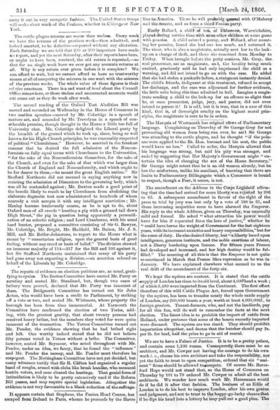mature art, and seconded by Mr. Trevelyan in a speech
of con-
siderable promise, though thought in the House a little too full of The. Marquis of Westmeath has original vibws of Parliamentary University chat. Mr. Coleridge delighted the Liberal -party by language. Complaining on. Thursday of Sir George Grey for not the breadth of the ground which he took up, since, being so well preventing old women, from being, run over, he sail Sir George known for his High-Church principles, he was reasonably suspected was attending to the cattle plague, and he thought " if the pole- of political " Churchiness." However, he asserted in the frankest axe were applied to the Rt. Bon. baronet and his seat, the public
manner that he desired the full admission of the Noncon- formists on fully equal terms with Churchmen to the Universities, language was strong, but said his pity was stronger, and ‘.‘ for the sake of the Nonconformists themselves, for the sake of ended by suggesting that Her Majesty's Government might " en- the Church, and even for the sake of that which was larger than n the idea of changing the sex of the. the Church of England and Nonconformity, and which ought to, Sir George might retort that he is au old woman already, but he far dearer to them,—he meant the great English nation." be Sir has the misfortune, unlike his assailant, of knowing that there are Stafford Northcote did not succeed in saying anything new in limits to Parliamentary Billingsgate which a Commoner is bouad resisting the admission of Dissenters to the governing body, which to respect, though a Peer, it seems, is not.
was all he contended against ; Mr. Buxton made a good point of The amendment on the Address in the Corps Legislatif affirm- the benefit likely to result to lay Churchmen from abolishing the ing that time had arrived for more liberty was rejected by 206 elaborate dogmatic test now administered to hundreds of whom to 63. A subsequent amendment in favour of the right of the scarcely a unit accepts it with any intelligent conviction ; Mr. press to trial by jury was lost only by a vote of 188 to 65, and Henley became irrelevantly coarse, as he is apt to do, about these increasing majorities seem to have alarmed the Emperor. Oxford men of all creeds " hunting a pig with a greased tail down His reply to the whole Address; given on Thursday, was unusually High Street," the pig in question being apparently a personifi- mild and formal: He asked " what attraction his power would cation of an eclectic religion ; and Lord Cranborne, with his usual have for him if separated from the love of justice," whether he hard banter, proposed a committee consisting of Sir G. Bowyer, " could have borne the weight of Government for the last eighteen Mr. Coleridge, Mr. Bright, Mr. Hadfield, Mr. Baines, Mr. J. S. years, with its incessant anxieties and heavy responsibilities," but for Mill, and Mr. Butler-Johnstone, to report to the House what is the sense of duty. He also desired liberty, but "a liberty based upon meant by " unsectarian religion, upon the general basis of good intelligence, generous instincts, and the noble exertions of labour, feeling, without any creed or basis of belief." The division showed not a. liberty bordering upon licence. For fifteen years France, an immense majority of 114-217 for the Bill and 103 against it, had developed and increased, and her high destiny would be ful- but Sir Stafford Northeote maintained that many of his party filled." The meaning of all this is that the Emperor is not quite had gone away not expecting a division,—an assertion echoed on so convinced in March that France likes repression as he was in






























 Previous page
Previous page